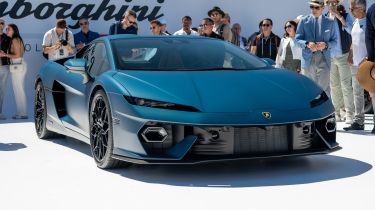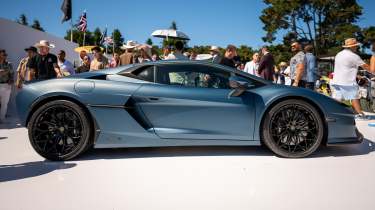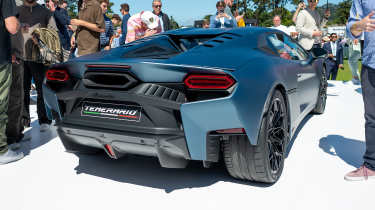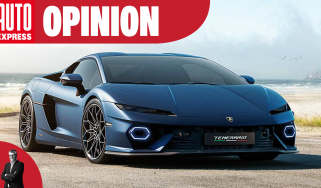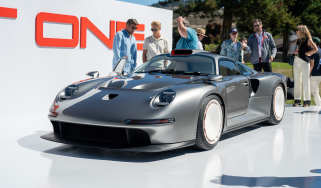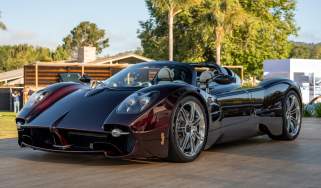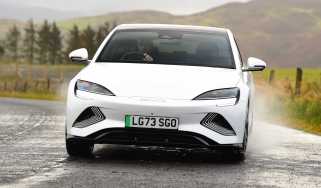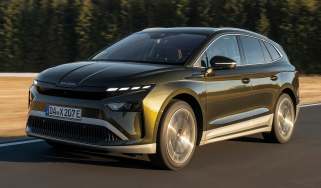Lamborghini Temerario: next-generation V8 supercar gets £260k price tag
The successor to the Huracan loses displacement but gains twin-turbochargers
Lamborghini revealed its long-awaited Temerario this summer, and now we know how much the new Italian supercar will cost with two variants being made available.
The ‘standard’ Temerario will be priced from £260,035 with the lighter, more focused Alleggerita versions priced at £297,235. An on sale date in the UK hasn’t been disclosed, but we suspect it’ll be offered up in the first part of 2025.
As a replacement for the Huracan, which had a lifespan of 10 years between 2014 and 2024, and became Lamborghini’s most popular car before the Urus SUV arrived, the Temerario has rather big shoes to fill. Looking to the future, Lamborghini has done away with naturally-aspirated V10 power and instead introduced turbocharging and electrification to its ‘baby’ supercar.
The lineage of normally aspirated, mid-engine V10 Lamborghinis stretches back to the Gallardo, which was introduced more than two decades ago. But for the Temerario, the company has invested heavily in a new specification of twin-turbocharged V8 powerplant, complete with a flat-plane crankshaft. This can match the potent output of the unit in the Urus SUV, while delivering a higher redline for a more visceral sound.
The new 4.0-litre engine (a so-called ‘hot V’, because its two turbos are located within the V of the layout) can rev to 10,000rpm, with peak power of 789bhp produced between 9,000rpm and 9,750rpm. Its 730Nm of torque is available between 4,000rpm and 7,000rpm.
Lambo’s chief technical officer Rouven Mohr says: “With the V8, the amplitude and frequency of the sound increase as the engine speed rises.” He adds: “Drivers will be roused by the powerful sound.”
The Temerario is the second example of a Lamborghini ‘High Performance Electrified Vehicle’ (HPEV), after the Revuelto, and it’s a plug-in hybrid. Three electric motors boost the performance, with each unit producing 148bhp. The first is integrated into the V8 engine housing, and it sits between that powerplant and the eight-speed dual-clutch automatic transmission. It contributes 300Nm of torque, and can deliver this at any time to minimise turbo lag, as well as acting as a starter-generator.
The other two electric motors are based on a front e-axle that weighs a mere 73kg. They can deliver all of their 295bhp if required, or up to 2,150Nm of torque, making the Temerario four-wheel drive – and the torque can be vectored across the axle to assist handling agility. The total output of this complex drivetrain is 920PS, or 907bhp – enough, the Italian supercar manufacturer claims, for a top speed in excess of 210mph, and a 0-62mph acceleration time of 2.7 seconds.
The gearbox is based behind the V8, freeing up space in the centre tunnel for a 3.8kWh battery. This modest capacity reveals that the cell’s focus is purely to support the Temerario’s extra performance instead of any electric-only running, although Lamborghini says the car can operate in zero-emissions mode, and that its CO2 output is up to 50 per cent lower than that of the Huracan. The battery can be replenished directly by the V8, or via a 7kW domestic charger.
The gearbox itself is lighter than the seven-speed unit from the Huracan, and it offers greater flexibility because of the e-motor integration. Lambo claims rapid shift times, and drivers will be able to sequentially downshift by holding the left steering wheel-mounted paddle and pressing the brake pedal, simultaneously.
A total of 13 driving modes are offered, selectable via rotary controllers on the steering wheel. Some are dedicated to managing the hybrid energy flow; for example, ‘Recharge’ cuts the powertrain’s output to 715bhp to allow the car to focus on topping up the battery. ‘Corsa’, on the other hand, unleashes the full 907bhp and harnesses torque vectoring and more aggressive gearshifts. There’s also a Launch Control system and a Drift Mode – another first for Lamborghini.
The body shape is an evolution of Lamborghini’s recent mid-engined styling language. Described by the brand’s design chief Mitja Borkert as “essential and iconic”, it incorporates a new daytime-running light signature with further use of geometric hexagonal motifs. There’s a fixed rear spoiler and a wide diffuser, while the tail-lights allow air to pass through, helping to cool the complex powertrain that’s permanently on show beneath the transparent engine cover.
Inside, there’s a trio of displays on the dashboard: two for the driver (a 12.3-inch instrument panel and an 8.4-inch screen for infotainment), and one 9.1-inch unit directly in front of the passenger. The software can also hook into the optional Lamborghini Vision Unit (LVU) camera set-up, to offer a safety-focused dash cam and what Lambo calls a “memories recorder”, mixing video with lap telemetry.
The cabin should be a little more usable than the Huracan’s, with more head and legroom, as well as improved visibility. There’s a small amount of storage space behind the seats, and the main front boot has a capacity of 112 litres – around 12 litres more than in the Huracan.
Lamborghini says the new model offers far greater scope for customisation than before. The car is being launched with two new specific colours, but 400-plus shades will be available, along with special liveries and various wheel designs. A range of carbon-fibre elements – from the front splitter and side-mirror caps, to the instrument cluster, air vents and steering wheel, will also be offered.
In another first for Lamborghini, a lightweight package will be available at launch. The Alleggerita set-up shaves more than 12kg from the car’s weight through lighter body components alone, and this gain can be increased to more than 25kg if specific interior trim and carbon-fibre wheel rims are also specced. The new configuration further increases the improvements in rear downforce compared with the Huracan Evo.
There’s no word yet on pricing for the Temerario, but given the complex technologies involved, and based on the price hike of the Revuelto compared with the car it replaced, we’d expect an increase over the Huracan’s figures. That could give the new arrival a starting price of between £275,000 and £300,000.
Q&A: Mitja Borkert. Director of design, Lamborghini
We talk to the Temerario’s design lead about the journey from notebook sketches to fully realised supercar
What is the overall goal when you start designing a new mid-engined Lamborghini? Compared with, for example, the Urus SUV?
"It’s important that every model line is having its own character, for starters. But with the Temerario, every aspect of the car – inside, outside, every detail – was created for the maximum fun to drive."
Is there an obvious starting point?
"The silhouette, really. That’s at the heart of the Lamborghini design DNA. We give adrenaline a shape. It’s important for me that you can recognise one of our cars from far, far away. That’s achieved through the side profile, but also through elements such as the rear, which has to look like a spaceship. If you mean an influence, one car that was in our minds was the Bravo, a Lamborghini concept from 1974. I was particularly struck by its tail-lights, which were just two cubistic blocks."
It must have been quite a challenge to work with engineering on this car, though, given how complex the powertrain is?
"A challenge, yes, but also an opportunity. I enjoy working with my colleagues across all aspects of the car. If you take the experts in aerodynamics, for example, I never view them as the ‘enemy’; for me they are the ones who are enabling us on the design side. It’s always a sort of collaboration, because Lamborghinis are all about high-performance surfaces. So I was meeting with the aero engineer on a weekly basis; he was telling me what he needed, and then my team was able to use this. This approach has changed over the past 20 years. Before, there was maybe conflict between design and engineering. But I think you can tell when this happens."
Can you mention any specific areas that were particularly tricky?
"Keeping the car compact. We have a twin-turbocharged V8, which runs hot, so we need enough outlets that allow that heat to escape. But at the same time, we couldn’t make the Temerario really large, and we also wanted to achieve this puristic form, which is hard if you end up having a lot of air vents. And then coping with the performance, as well as helping to deliver it; we are in an era when we’re making the fastest vehicles that Lamborghini has ever created, and that can only happen when design and R&D understand each other."
You’ve been a designer for more than 20 years, including a long time at Porsche. How many times have you played with a ‘baby Lambo’ on paper?
"Wow! Hard to tell. Sketching is part of my personal life, and it’s something I’ve promised myself I’ll try never to forget. Even as a design director, with a large team working with me, I need to keep it going. I can give you an example; the hexagonal elements at the front were something that looked great on an early sketch. It needed a lot of work to make into reality, but it started in a sketch."
What do you think of the new Temerario? Share your opinion in the comments section below...
Find a car with the experts

